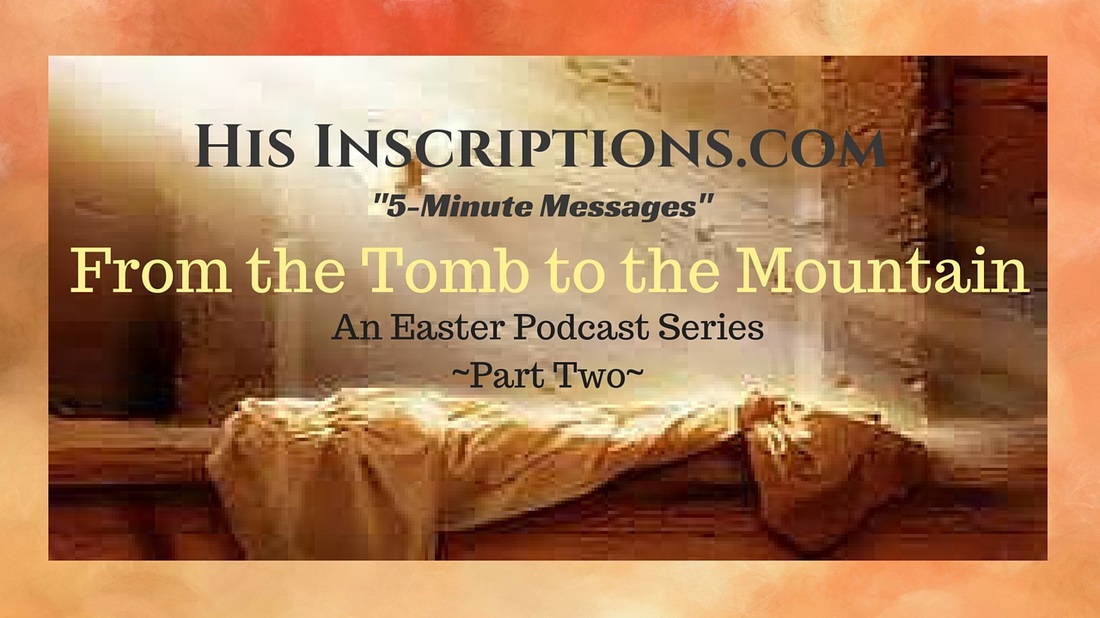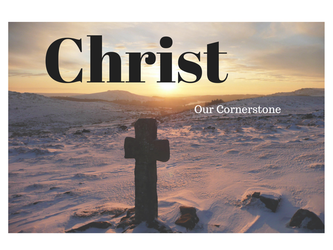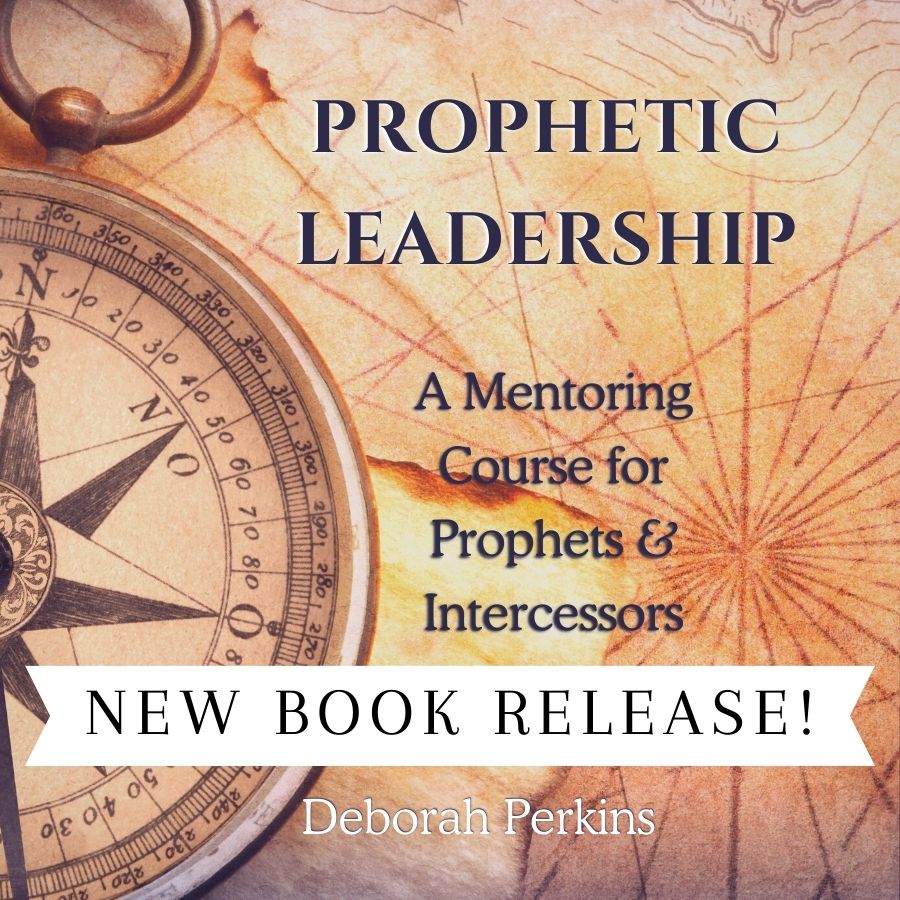|
The crucifixion of Christ is a reminder that all of us have to deal with times of death in our lives. We may have to face the death of a loved one, or the death of a dream, or the death of a hope we hold dear. At some point, we all come to our tombs, as Mary did in the resurrection story, and we have to confront the harsh realities of our mortality. Above my writing desk in my tiny office at home is a wall-art stencil, a quotation that my husband gave me last Christmas. It reads: “Pray about everything. Worry about nothing.” Like many women – mothers especially – I have a tendency to worry. I think my hubby hoped a “subtle” reminder on the wall might cure me of the habit! The older I grow, the more I notice the storms. I am like a tree, whose increasing height causes its branches to tremble in greater gales. As an immature shrub I did not notice the weather as much, being close to the ground. As a more mature evergreen, I feel the wind rustle through every branch, shake every leaf, and chill me to the core. I see more, gain greater perspective, and face greater fears as I grow.
Just because you're a Christian doesn't mean you're fearless.
In fact, God tells us not to fear roughly 365 times in the Bible. That's once for every day of the year! Sure, there are some amazing examples of fearless faith out there, from the spies who entered the Promised Land to present-day martyrs facing ISIS. But most of us, even on a good day, battle fear in one form or another. We know that fear is part of the curse (see Leviticus 26:36-37 for an example), and God gives us the ability to overcome our personal fears. But what of the larger-scale fears, the things that threaten to undo not just us, but our communities, our nation, and our world? These things are on the rise as Satan propels the battle between good and evil to a climax. Luke records Jesus's words, saying that men's hearts will fail them "from fear and the expectation of those things which are coming on the earth." (Luke 21:26) Earthquakes, diseases, and famines will be the norm. He says the end times will be full of "fearful sights and great signs from heaven." (Luke 21:11). Those words don't seem very comforting at first glance. Many Christians avoid the end-time prophecies in the Bible, not just because they don't understand them, but because they seem full of "doom and gloom" for a people who should be continually filled with joy and peace! I believe that every word Jesus spoke is still relevant to us today. And as I began to study fear as it relates to current events, I realized that these end-time prophecies are a critical key for us as we overcome our fears about what lies ahead. The reason? A known enemy is easier to defeat than an unknown one. The Genius of Jesus
Most of our fears are irrational, drawing their power from our emotions rather than the facts in front of us. Those of us who have been hurt in certain areas are predisposed to fears in the areas where we were wounded.
I once was horrified to find a drug addict hiding behind his shower curtain, in an apartment a realtor intended to rent to me. For a while after that incident, every time I opened a shower curtain, I did so with trepidation! Statistically, the likelihood of that ever happening again was extremely low. But the fears persisted until I dealt with them.
The genius of Jesus is that He prepares us ahead of time for what is to come. The power of the fear I had about the man in the shower came largely from the element of surprise. What you don't expect alarms you far more than what you can foresee. This is why we prepare a child, for instance, by telling him that the shot at the doctor's will hurt, but only for a minute. We want him to know how it will end and assure him that he will be safe.
In the same way, Jesus tells us that the end times are going to be difficult, but only for a while. He takes great pains to give us details about the tribulations and about what He expects from us as we face them. He gives us specific things to do that will help us feel more peaceful during a chaotic time. Click here for a free, printable download: "10 Things Jesus Wants You to Do in the End Times." Perfect Love Drives Out Fear
Apart from the wisdom of God, we also have the love of God to help us overcome fear. 1 John 4:18 tells us that perfect love casts out fear, because fear has to do with torment, or punishment. In the end times, only those who are living apart from God's ways will face punishment. I know from experience that when we pray and ask God for more of His love, He is eager to comply!
So overcoming fear is a two-pronged approach. We need both the wisdom of God found in Scripture and the experiential knowledge of the love of God in our hearts. Isaiah clarifies this beautifully: "Wisdom and knowledge will be the stability of your times, and the strength of salvation." (Isaiah 33:6). Your testimony of God's love, combined with the strategic wisdom He gives you through His Word, will cause you to overcome any fears you might have about the end times. It will keep you stable when the world is falling apart. Instead of running from Goliath, as the Israelites did, you'll stand and slay your Goliath like David did. You'll be fearless in the face of fear.
c. Deborah Perkins, His Inscriptions.com. All Bible references NKJV unless noted.
Deborah Perkins is a prophetic teacher whose passion is connecting others with God. She writes about knowing God and hearing His voice at His Inscriptions. You can subscribe to her weekly blog for free, follow her on Twitter, or contact her directly here.
Last week I was given a precious gift by a friend in Tennessee, a reader of this blog and one of my strongest supporters. She gave me the gift of time spent with a dear friend relaxing, worshiping, and working together on some projects. What she didn't realize she'd given me was equally important: the gift of perspective. As a wife and mother, I don't travel nearly as much as I used to. Unlike my husband, I actually love the adventure of travel: visiting new places, interacting with different cultures, and experiencing the "flavors" of life lived in other places! So from the moment my plane began soaring above the clouds, my heart was rejuvenated as well. Here's what I discovered. Tennessee, as a "Bible Belt" state, is still proclaiming the Word of God. Everywhere we went, from an inner-city high school graduation, to Walmart, to the Christian-owned Hobby Lobby store, what I noticed was the Word of God, expressed in amazing creativity. The Word is literally "in your face" wherever you turn. Plaques and trendy chalkboard artwork with Bible verses line the shelves of even mainstream stores. A local family whose home I visited makes no effort to hide their faith; it is evident the moment you walk in the door. During a high school ceremony, I heard both ranking Tennessee politicians and local teachers and students pray and cite the Word as they spoke to the graduating class. The choral selection? A rendition of Numbers 6:24, which in case you haven't read lately, is the Aaronic blessing over Israel: The Lord bless you and keep you;
It was beautiful. After several days of experiencing these constant public proclamations of the Word, I was feeling incredibly encouraged. How refreshing! It reminded me of Moses' instructions in Deuteronomy:
These words which I command you today shall be in your heart.
Comparing Tennessee to my home state, where a simple prayer by a student is outlawed and transgender bathrooms might soon become the norm, I almost didn't want to return home! New England suddenly seemed very dark to me. I had gained some perspective.
A Religious Spirit?
I did, of course, return home to my wonderful family, and know that I am called to New England for ministry purposes. As I shared my news of the trip with a fellow New Englander, however, their reaction was to say: "Oh, all that public display of Christ down South is just a religious spirit. It doesn't mean anything."
Well, apart from knocking the wind out of my sails and quickly deflating any joy I had experienced, this person missed a fundamental truth that Paul brings out in Philippians. Paul writes: "What does it matter? Just this, that Christ is proclaimed in every way, whether out of false motives or true; and in that I rejoice." (Philippians 1:18; see also previous verses). It is true that some proclaim Christ insincerely or from selfish ambition, while others proclaim Him out of love. It is not our job to decide who is sincere and who is not. Our job, according to Jesus in Matthew 28, is to simply make Him known, and to keep the Word prominent in our lives. The perspective I gained in the South encouraged me to proclaim Him even more loudly in the North. A Southerner can just as easily say that New England is bound by an intellectual spirit which darkens the light of Christ in us. Rarely do I enter a New England home to find "PDA's" (Public Displays of Affection) for Christ! We are more likely to boast about our impressive array of educational institutions or big-city job opportunities than about our Christianity. I became motivated to turn up the "dimmer switch" on my faith. Dial it up. Light up the room. Make a greater effort to inspire instead of retire. We sorely need more light here, lest the long, wintry days and spiritual darkness overwhelm us. As a local pastor often quips, "When you love something, it shows!" The apostle Paul was also confined for a time, far from the sunny green pastures of Tennessee! Yet the letters written from his jail cell impacted more people than he ever dreamed of reaching in his freedom. The darkness of his situation did not hinder him from proclaiming Christ. His limitations became the source of his greatest ministry. It may be easier to be a Christian down South, where everyone agrees with you. It's certainly sunnier and warmer, and maybe that's why many New Englanders can't wait to go South! The truth is, though, that the light of God already in you is warm enough and sunny enough to radiate a significant amount of heat, no matter where you live. I'm choosing to pursue an assignment to bring His light into what seems like a much darker place at the moment. What will you do? Prayer Challenge: Instead of being envious of others' situations, ask God to give you perspective on your situation. Are you hiding the light that is in you, for fear of offending someone? Has being "politically correct" become more of the norm for you than being "biblically correct?" Ask God to show you what you can do to put your love for Him on display! Will you be mocked or misinterpreted as "religious?" Maybe. But the wonderful thing is that you might just encourage somebody. I'll be praying for you, that your future shines more brightly than your past. c. Deborah Perkins, 2015
Deborah Perkins is passionate about helping people connect with God. She writes about knowing God and hearing His voice at His Inscriptions. To contact her directly, or to send a prayer request, click here.
What makes one person thrive while another barely survives? Why do some people seem to live almost effortlessly, while others go through life hanging on by their fingernails? Even Christians are not exempt. We cling to the Gospel's wonderful hope of heaven. But is that all there is? What about the problems in this present life? What do I do between now and eternity? I believe there is a key difference between survivors and those who thrive in life. Or for Christians, between the survivors and the revivers! It's not just a difference between rich and poor. It's actually a different state of mind. To describe this, let's look at the law of the jungle. There's a big lie that the devil has promoted among God's people since the beginning of time. It is so big, and so successful, that his strategy really has not changed much over the years. From Genesis to Revelation and right into the present day, Satan and his minions have invested untold amounts of time and energy into marketing this lie. Do you know what it is? It is this: "Did God really say...?" Early one morning the Lord woke me, saying: "Treat obstacles not as occasions for worry but as opportunities in the Spirit." It was an encouraging word He wanted me to share with a friend who was about to experience several days of new obstacles. I shared the word, thinking it was a catchy little phrase! Not long after that, though, He showed me a picture of the rapids. The image of a river is powerful in Scripture; Psalm 46:4 speaks of a river "whose streams make glad the city of God," and Ezekiel prophesies about a river in God's temple whose waters will increase until they become too deep to cross. It is a picture of the Holy Spirit. Not surprisingly, a popular expression in the Charismatic renewal of the 1990's was: "Jump in the river!" (Meaning, jump into the flow of the Spirit!). But rivers, especially the rapids, contain obstacles. Some are small and easily floated over. Some are so deep they are virtually unseen. It is the larger ones that tend to cause us difficulties in our faith-walk. The ones that seem to block our way or hold us back from going to where we want to be. The ones that are too big for us to move. We are not meant to get stuck behind obstacles, but to continue flowing in the river of the Spirit as we journey along. In order to do this, we must know what kind of obstacle we are bumping into. It is here that the wisdom of God is indispensable. Two Types of Obstacles Here's what I felt the Lord was saying. Obstacles along the side of a river - usually rocks, soil, or branches - comprise the boundaries of the river. They are there as protection, as an obvious division for us between the Spirit and the flesh. If we are bumping into these it often means we have drifted to the edges of the movement of God in our lives. Staying here can mean stagnancy, like being caught in the circular undulations of an eddy. We haven't abandoned God or gotten out of the river to walk on our own, but we may not be making any progress. Fear of the rapids may have caused us to return to safer ground. We may be fascinated with those outside of the river, who seem to skip along so cheerfully in the greener grass. Perhaps we are snagged on a painful outcropping that just won't seem to let us go. Whatever the reason, we recognize that our pace has slowed, but with a little effort, we can return to the flow of the river. God has not abandoned us, and our momentary collision with the banks of the river only teaches us to run more consistently down the central channels of His grace. Rocks or boulders inside the river, however, pose a different challenge. In most cases, these obstacles are meant to redirect us as we flow in the Spirit. These are obstacles whose roots are so deep or whose surface so great that we cannot float over them. They must be recognized for what they are and confronted with God's strategy so that we can move beyond them. What is that strategy? Water flows over and around the rocks in a river. Rarely are rocks are dislodged to make water's passage easier! God might choose sometimes to supernaturally remove a boulder that is blocking us, but more often than not, God expects His river to flow around and beyond the things that would try to block the water's flow. We are not meant to hold on to these obstacles or become stuck when they arise. In short, too often, our prayers focus on asking God to remove things that are meant to redirect us. We are never called to grow stagnant in the Spirit, whining and complaining about the impassable boulders we face. Life in the Holy Spirit is a life of constant movement and change, just like the life of a river. A better prayer might be, "Lord, help me to see this obstacle for what it is and to navigate around it so that it doesn't stop me from going on with You." Returning to my time with the Lord early that morning, I realized: the key to navigating obstacles of any kind was right there in the word He gave me initially: obstacles are nothing more than opportunities for us to stay in the Spirit. Let the Source of the river set your direction. Let the flow of the river keep you within His boundaries. And let the strength of His current propel you over and around every obstacle you might encounter. Deborah c. Deborah Perkins, 2015  Deborah Perkins is passionate about helping others connect with God. She writes about Knowing God and Hearing His Voice at His Inscriptions.com. Follow her on Twitter@DeborahSPerkins, or Facebook as HisInscriptions. One of our family's favorite movies to watch during the holiday season is Home Alone. You're no doubt familiar with the storyline: 8-year-old Kevin is left behind by his rather large (and obnoxious) family when they travel to France, and ends up defending his upper-middle-class home from a dynamic robber-duo named the "Wet Bandits." Two hours of hilarious pranks and traps set by this tyke end with a Christmas day arrest of the bandits and a much-matured little boy. What we love about this movie is the creative ingenuity of a child that outwits the "professionals." Using only the resources he has at hand, most of them commonplace in an 8-year-old's world, he masterminds a strategy that is so unexpected to the pros, it almost has to succeed! From the ice on the stairs to the toy cars in the hall, we watch Kevin outwit and - just barely - outlast the enemies, until he is reunited with his family. The cops don't show up until the boy has done his job protecting his home. God's Version Speaking to me yet again in His unusual way, God drew my attention this week to His "Home Alone" story in the Bible. Luke puts it just after the "traditional" Christmas readings of the birth of Jesus, in chapter two: Now His parents went to Jerusalem every year at the Feast of the Passover. And when he was twelve years old, they went up according to custom. And when the feast was ended, as they were returning, the boy Jesus stayed behind in Jerusalem. His parents did not know it, but supposing him to be in the group they went a day's journey, but then they began to search for him among their relatives and acquaintances, and when they did not find him, they returned to Jerusalem, searching for him. After three days they found him in the temple, sitting among the teachers, listening to them and asking them questions. And all who heard him were amazed at his understanding and his answers. And when his parents saw him, they were astonished. And his mother said to him, “Son, why have you treated us so? Behold, your father and I have been searching for you in great distress.” And he said to them, “Why were you looking for me? Did you not know that I must be in my Father's house?” And they did not understand the saying that he spoke to them. And he went down with them and came to Nazareth and was submissive to them. And his mother treasured up all these things in her heart. And Jesus increased in wisdom and in stature and in favor with God and man. Luke 2:41-52, ESV Jesus was a boy of twelve who, like Kevin, was left behind in His Father's house. Three full days went by before his parents returned to find Him quite peacefully settled in His temple, debating with the scholars. Like Kevin, Luke tells us he grew and matured after this, due in part, perhaps, to engaging His "enemies" (the religious leaders) who would later persecute him. In the movie, Kevin listened to the robbers and learned the very hour they planned to rob his family's house, so he had time to prepare a strategy that would defeat them. In Luke's text, Jesus is said to have both "listened" and "asked questions" of His future tormentors. Their dialogue gave Him valuable insights concerning the scribes and Pharisees. It was these very same leaders whom He would "trap" with His own questions later in life. The boy Jesus grew, matured, and learned how to defend His Father's house - the temple - from those would would defile it. His strategies were different; He used words, not toys, as His traps, but he successfully enacted His plan to restore to God what was stolen by the enemy. Bringing It Home Here's what's interesting about these stories. I believe God regularly gives us "home alone" moments in life, too. We are never completely alone, of course, but God gives us moments when our normal support systems - friends, family, or even the voice of God Himself - disappear for various reasons. We come face to face with spiritual or natural enemy forces, and we learn to defend what we love from predators who would rob us. Forced to draw upon inner strength and the resources we have at hand, we learn to stand our ground and fight back. Like David the Psalmist, we may find that using the standard "grownup armor" isn't the best strategy. We learn that the resources most familiar to us at the time can be effective, no matter what stage of life we are in. Our unique gifts and talents are surprisingly adequate, in God, to overcome our enemy. In fact, it is what enemy is not expecting from us - like our slingshots - that yield the greatest results! Be Who You Are! My hope is that this simple analogy will encourage you to be who you are now at this time in God, and not to belittle yourself because your faith or your gifts are too small. The truth is, none of us is fully mature yet. The wonderful thing about God is that He takes our childlike efforts and multiplies their effectiveness with His power. As my spiritual dad always says, "We win!" Are you ready to use your unique abilities to defend the Kingdom of God in your life? When you use your gifts, you do real and lasting damage to the enemy. Your confessions of faith set angels in motion. You overcome your fears and grow up a bit in the process. And God is gonna be impressed with your bravery and zeal for His house. I guarantee it! c.Deborah Perkins, 2014  Deborah Perkins is passionate about helping others connect with God. She writes about knowing God and hearing His voice at HisInscriptions.com. Follow Deborah on Twitter@DeborahSPerkins, or click here to subscribe to her blog.
As I worshiped this morning, the Lord surprised me by speaking through the words of a classic hymn. I was singing William Bradbury's familiar song, "Solid Rock," penned in the 1800's and recently revamped by Hillsongs as "Cornerstone." Here are the words:
It's time to give the devil a one-two punch! You're familiar with the term, of course: a boxer throws a left-handed jab immediately followed by a right cross punch. The same technique is also used in fencing. It's a fast combination of two actions designed to give an athlete the upper hand. If you're a believer, you should be using a "one-two punch" strategy today. Here's why. Current events are unfolding at an alarming pace. The war on terror is expanding, reaching many nations. Most of us lack the political influence we might feel we need to effect change. In light of this, the enemy wants us to feel hopeless. He knows that powerlessness can lead to fear. Luke 21:26 confirms that in the end times, men's hearts will fail them "from fear and the expectation of those things which are coming in the earth." Preemptive Prayer & Compassionate Provision The Bible offers hope, though, in the form of a one-two punch. The first punch is prayer, and the second is provision. The Bible says that our prayers are powerful and effective (James 5:16). They work because we have been seated with Christ in heavenly places, where all things are subject to Him (Ephesians 1:20-22). As joint-heirs with Christ, we receive the blessing of being "above only and not beneath" (Deuteronomy 28:13). This means that as we pray, no matter how impotent we may be in the natural, we rise to become agents of transformation in the Spirit. We partner with Jesus in His ministry of intercession. By tapping into the unlimited reach and resources of the Holy Spirit, we now pray and effect change at every level of government, business, education, religion and any other man-made institution. Joseph as Prototype The eleventh son of Jacob is a prophetic prototype for us here. After being sold into slavery and betrayed several times, Joseph was transformed from reject to ruler. He left the dungeon of the enemy and was promoted to second-in-command of Pharaoh's kingdom (Genesis 37-50). Like Jesus, he used his prayers of faith to enter in to a place of provision. Having overcome his own adversity through prayer, he then helped others to overcome, through practical provisions for a worldwide famine. I believe we have a similar purpose. Rather than succumbing to fear, we can throw the first "punch" of prayer and follow it up with a second "punch" of provision for the disasters that do occur. Like the Proverbs 31 woman, we are wise to prepare our families in advance for whatever the "winter" season may bring, so that we are safe and can serve others in time of need. We can be "angels with skin on," ministering servants empowered by the voice of the Lord and serving humanity with practical assistance or spiritual gifts. No More Shadowboxing We are created to be strong spiritual athletes: to fight the good fight of the faith and to fear nothing. Paul says we are not called to be shadowboxers, Christians who throw ineffective punches at the air (See 1 Corinthians 9:26). Our faith is the antidote to fear, and our faith gives us a specific strategy for a Kingdom "win." What will you do with your spiritual authority in these dark days? c. Deborah Perkins, 2014  Want to know God better? Join us! Partners receive free, inspiring articles and ongoing prayer.Click here to subscribe. Your email stays private. Just for a moment, think of the smartest person you know. Who do you think is the wisest, the most inspiring, maybe the most revelatory person you've ever met? Do you have someone in mind? Good. Now hold on to that thought as you read today's story! My high-school-aged son came home with his new Honors Biology textbook this week. It is a monster of a book, several inches thick and so heavy that his teacher has the students keep one at home and one at school to avoid carrying them back and forth! It was on the table where I had my quiet time one morning, so I opened it up to take a look. Impressive, I thought. Just one sentence from the first chapter intrigued me, and here was a whole wealth of information about our biological makeup. A handy little diagram in another chapter explained the respiratory system in beautiful detail. I called my 8-year-old over to see it. "Look!" I said excitedly, "This is how you breathe!" I began teaching him about carbon and oxygen molecules and how they interact with our blood. Thinking I'd probably lost it, my unimpressed 8-year-old found something better to do. But as I sat there, amazed at the amount of information contained in just this one volume, the Holy Spirit interrupted me. "You are impressed with just one line of this book," He noticed. And rightfully so, I thought, since just one word from Your mouth has the power to change a life! "This," He reminded me, "is just a beginner's book in the entire field of Biology. There are volumes more to be learned." So true, I thought. Here was one book, in just one field, in a world containing many other fields - chemistry, language, history, sociology, computers - and on and on. The spiritual implications were staggering. I was suddenly awed by the vast quantity of information we know, and how little even the most degreed specialist knows in comparison to the whole. How immense is the sum of all knowledge! How amazing the God who created such wisdom, and how much more there is to know! The prophet Isaiah came to a similar conclusion thousands of years ago: "Who has directed the Spirit of the Lord, or as His counselor has taught Him? With whom did He take counsel, and who instructed Him, and taught Him in the path of justice? Who taught Him knowledge, and showed Him the way of understanding?" Behold, the nations are as a drop in a bucket, and are counted as the small dust on the scales." "To whom then will you liken Me, or to whom shall I be equal," says the Holy One. Isaiah 40:13-15 & 25, NKJV In the midst of Isaiah's revelation, God questions Israel as to why they complain that their way is hidden from the Lord, and that He does not see or know what is going on in their lives. (See Isaiah 40:27). To question a God whose understanding "cannot be fathomed" is ridiculous, really, and yet we are all guilty of it at times! We listen with alarm to the doomsday prophecies of the week: Isis, Obamacare, global warming, and we wonder whether God knows. We would do better to meditate on the immeasurable magnitude of God! If we would do this, Isaiah notes, we would be invigorated and strengthened again (Isaiah 40:29-31). While God is not dispassionate about such things, (nor should we be), He is not worried about them (and again, neither should we be). Psalm 2 gives us His perspective on the nations: Why do the nations rage, and the people plot a vain thing? The king of the earth set themselves, and the rulers take counsel together, against the Lord and against His anointed, saying, "Let us break their bonds in pieces and cast away their cords from us." He who sits in the heavens shall laugh, the Lord shall hold them in derision... the Lord has said to Me... Ask of Me, and I will give you the nations for your inheritance, and the ends of the earth for your possession." Psalm 2:1-4 & 7-8 Like my musings on the vast sum of academic knowledge, we need to see the bigger picture: the nations, God says, are our inheritance. Neither Isis nor Congress can defeat God in all His immensity! When we begin to take hold of the basic idea that the earth and everything in it belongs to the Lord, we will be less fearful of what the nations do and more impressed with what God can do through us. The wisest man's thoughts and a nation's best-laid plans are no match for an unfathomable God. As a pastor-friend of mine used to say, "It's not: 'God, look at my problem!' It's: 'Problem, look at my God!' " The next time the wisdom of the world renders you awestruck or fearful, remember this: to God, it is nothing but a drop in the bucket. c. Deborah Perkins, 2014  His Inscriptions is a ministry devoted to Knowing God and Hearing His Voice. Join us free - partners receive weekly inspiring articles & ongoing prayer. It's easy: Justclick here to subscribe. Thank you for reading! I was reading the parable of the ten talents last week and I noticed something I hadn’t before. It is fear that causes man to hide. It is love that causes God to seek. There is no fear in love. But it is a choice to believe the love. Fear causes us to hide ourselves and our talents so that God cannot use either. Jesus describes the Kingdom of God in Matthew 25 as a Kingdom whose Lord entrusts his servants with gifts, goods, or talents. Then he leaves. Those who use and multiply the talents are rewarded; those who do not, lose even what they had. There are several great principles in here, not least of which is the law of diminishing returns. In other words, you use it or you lose it. I believe this is true in the area of prayer as well. But what causes a person to lose it? Even the wicked servant, who hid God’s talent in the ground, acknowledged that the talent belonged to God: “Look, there you have what is yours.” But just before this, he said, “I was afraid, and went and hid your talent in the ground.” (Mt. 25:25) Fear doubts the character of God. This servant wrongly perceived God as a hard and unfair man, reaping where He did not sow. Although the seed actually belonged to his Lord, this servant resented, perhaps, the labor he must invest to grow that seed. He decided instead to hide it. Adam and Eve responded similarly in Genesis chapter 3. As a result of their sin, shame and fear entered their minds, and verse 9 says “Adam and his wife hid themselves from the Presence of the Lord among the trees of the garden.” When the Lord called to Adam, asking where he was, Adam responded: “I heard your voice in the garden, and I was afraid because I was naked; and I hid myself.” And of whom have you been afraid, or feared, that you have lied and not remembered, nor taken it to your heart? ~ Isaiah 57:11 We know that throughout the Bible, God commands us NOT to fear. Fear is not an option for the child of a loving Father. 1 John 4:18-19 says that he who fears is not made perfect in love. Why? Because fear has to do with punishment. The only one who wants us to be punished is the devil. The love that causes God to seek us out when we sin is the same love that provides clothing as a covering for our nakedness. It is the same love that causes His Son to bear the punishment for our failings so that we don’t have to. (See Genesis 3:21 & Isaiah 53:5). Compare Genesis 3:7 with Psalm 27. Fear induces us not only to hide ourselves, but also to provide for ourselves, usurping something that our loving Father planned to do. Adam and Eve sewed fig leaves together in order to make themselves a covering. But it was God’s intention to provide our covering Himself: “He shall hide me in His pavilion; in the secret place of His tabernacle He shall hide me; He shall set me high upon a rock.” (Psalm 27:5) Hiding and providing are God’s prerogative, not ours. It is in the absence of God’s Presence that the enemy tempts us to sin. Therefore, our best defense against the spirit of fear is to stay in the Presence of God as much as possible. “Pray unceasingly,” we read in a letter to the Thessalonians. How can we do this? Aren’t we busy enough? To pray nonstop, engaging our minds and our mouths, would be nearly impossible! Strategically, God has given believers one unique gift (or “talent”) to help us in this area: the gift of tongues. As we pray unceasingly in tongues, our spirits remain active in the Kingdom realm while our bodies are able to continue with whatever work we are doing in the natural realm. I believe that this particular talent is grossly underused, and has been even hidden by the church out of – you guessed it - fear. We fear the denominational division that comes from this kind of spirit-to-Spirit prayer, and yet it is indisputably one of the most powerful weapons in our arsenal. I have said often that the believer’s “secret weapon” is hearing God. Speaking in tongues enables us to communicate with God directly and to establish a “secure connection” in the Spirit which the enemy cannot penetrate. Think of it as Kingdom WiFi that is password-protected. Once we connect to this power source, we have access to all the wonderful wisdom of God, downloaded to our minds through our spirit. God has reversed the curse that came from Adam’s original sin. The shame of eating from the tree of knowledge has been replaced with privileged access to all wisdom and knowledge through the gift of the Holy Spirit. In this Jewish month of Elul, the traditional season for the King to visit His fields, our Beloved is searching for His Bride. He is walking through His Kingdom garden even now. When He asks where you are, will you be hiding? c. Deborah Perkins, 2014. All citations NKJV unless otherwise noted.  Like what you see here? Join me each week for more on knowing God! It's easy: just click here to subscribe. You'll receive free inspiration in your inbox that will help you deepen your relationship with God. Thank you for reading! |
Free Link to the Subscriber Resource Library when you join His Inscriptions!
About
Deborah Perkins Categories
All
Archives
April 2024
AuthorA severe hearing loss from childhood caused Deborah Perkins to develop what she now calls her secret weapon: tuning in to God's voice. A Wellesley College graduate and an award-winning writer, Deborah is now a wife and mother of 3 boys. Deborah has devoted over 25 years to professional and lay Christian ministry in New England and beyond. Her passion is inspiring people to cultivate greater intimacy with God. |























 RSS Feed
RSS Feed






